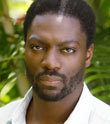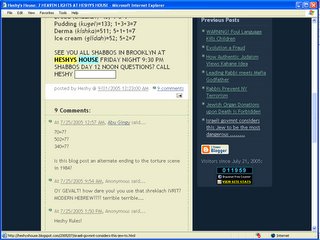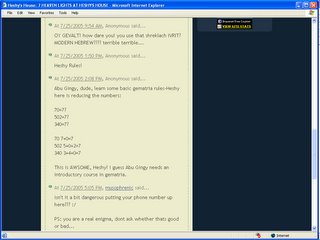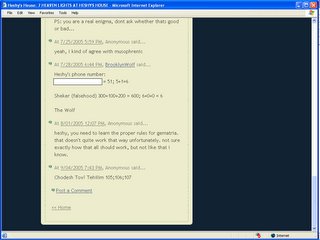

Last nights episode had a revelation.
One of the charachters (Mr. Eko - Left) sees a film that is missing some important moments.
He tells the other mysterious charachter (John Locke - Right) a story:
"There was a king Yoshiyahu of the Jews who wanted to rebuild the temple with gold from the treasury. He told his secretary to get the gold, but he returned empty handed.
He told the king that he found a old book. "
Eko says, "I too found an old book, on the other half of the island", and hands Locke a book, inside of which is found the missing moments of the film.
According to Torah.org
"On Tisha B’Av we just read Yirmiyahu’s anguished Kinah over the death of his beloved student and king, Yoshiyahu. King Yoshiyahu encountered his first accurate Torah when he was 26 years old 18 years after becoming king! Prior to that, the only Torah he had ever seen were those that his grandfather, King Menashe had corrupted by exchanging G-d’s name for various popular pagan deities! If not for the far-thinking courage of the Kohanim who hid a Torah from the corruption of Menashe, there would not have been an accurate Torah to be found anywhere in the world!. It’s foolish to think that the Written Torah demands any less trust to believe its divine and accuracy than does the Oral Torah!"
This drasha seems to make the point that given this history, believing in the written torah is just as big a leap of FAITH as the Oral torah.
On the blog Rabbi Reisman Navi Shiur i found the following:
"We've been learning about the malchus/kingship of Yoshiyahu, during which Jews worshiped idols. This led to the kohanim finding the sefer torah in the mikdash rolled to the tochacha/rebuke in parshas Ki Savo, a sign of punishment for Klal Yisrael's many aveiros. Yoshiyahu sent messengers to Chulda HaNeviah to find out what the sefer torah's position meant and what punishment G-d had in mind for Klal Yisrael. Thus concludes our brief introduction and we will henceforth learn about pasuk 20.
Chulda said that because the Jews were worshiping idols, they'd be punished. However, because Yoshiyahu was a great leader and got Klal Yisrael to do teshuva/to repent, he would die in peace without seeing the bad that will befall his nation. This response was conveyed to Yoshiyahu and was considered a zechus/merit for him. What was it? That he'd die before the churban habayis/destruction of the holy temple.
First of all, this sounds incredibly selfish. Yoshiyahu is told that although the mikdash will be destroyed, he will be dead before it happens so he shouldn't feel so bad. What kind of nechama/solace is that for a leader of Klal Yisrael?
Second, Yoshiyahu only lived 39 years. The churban took place 29 years later. Had he lived, it would have taken place when he was 68. The bracha/blessing was to die a younger man and wasn't zoche/he didn't merit to live to 68? Is this really a bracha? [I'm not 100% sure I got the numbers right...feel free to comment or write back if I'm wrong on this one.]
According to Nachlas Shimon (as cited by the late Ner Yisrael Rosh Yeshiva, Rav Yaakov Weinberg, zt"l,) we know that there are two tochachos/portions of rebuke in the torah. One is at the end of sefer Vayikra in parshas Bechukosai, while the second one is written in sefer Devarim in parshas Ki Savo. Ramban holds that the first one is for churban bayis rishon/the destruction of the first holy temple while the second is for churban bayis sheini/the destruction of the second holy temple. The sefer torah found in the time of Yoshiyahu was up to the tochacha in Ki Savo although Yoshiyahu was king before churban bayis rishon!?! Nachlas Shimon answers that were it not for Yoshiyahu the first churban would have been as permanent and terrible as the second was/is. However, because of his tzidkus/righteousness it didn't happen that way. It's called "galus Tzidkiyahu/the exile of Tzidkiyahu" because it happened during the kingship of Tzidkiyahu who followed Yoshiyahu. In fact, when Yoshiyahu died, Yirmiyahu HaNavi made a takana/decree that Jews should remember the accomplishments of Yoshiyahu. Rash"i says-in Divrei HaYamim-that's it is precisely for this reason that we say a kinah/lament in his memory a Tish'a B'Av; for the king whose life was an inspiration for generations to come who was able to turn things around and prevent that level of churban/destruction. That constituted sachar/merit for his neshama/soul. The neshama only wants its life b'olam hazeh/this earthly world, to be an inspiration to those that remain. "
Not surprisingly, Lost got it wrong. I think i have convincingly upgeshlugged them from rabbi Reismans shiur!
Anyway, this (ie the divinity of the Torah) has been a hot topic on the jewish blog world (BTA, Godol, Orthoprax, RTJB, RJ).
Some felt that Kiruv spent too much time trying to prove the Torah. I think from above it seems you have to have faith in it, it may not be provable in the traditional sense of the word.
I also found it ironic that this "lost book" made it into a plot on LOST.
Your thoughts?




